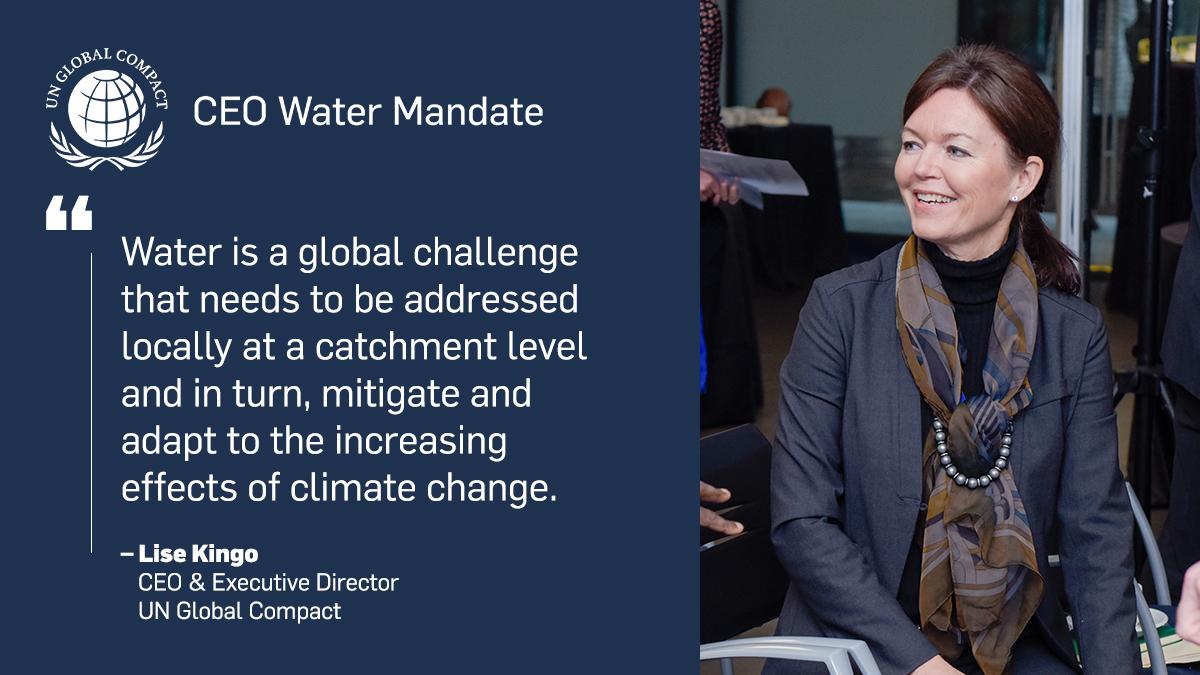As Climate Crisis Looms, Businesses Should Manage Water Challenges Locally
New publication launched at World Water Week offers guidance to increase water security

New guidance for companies to improve long-term water security
STOCKHOLM, August 27, 2019 /3BL Media/ — A new publication released today at the World Water Week in Stockholm offers guidance for companies on improving long-term water security.
The publication, Setting Site Water Targets Informed by Catchment Context: A Guide for Companies, was developed in collaboration between the United Nations Global Compact CEO Water Mandate, CDP, the Pacific Institute, The Nature Conservancy, UNEP-DHI Centre for Water and Environment, the World Resources Institute and WWF.
“As climate change impacts become more apparent, more floods and droughts are predicted, which leads to increased water risks. By 2025, two-thirds of the global population will live in water-stressed areas,” said Lise Kingo, CEO and Executive Director of the UN Global Compact. “Water is a global challenge that needs to be addressed locally at a catchment level. Our new guidance for companies explains how to set water targets to address catchment water risks, and — in turn — mitigate and adapt to the increasing effects of climate change.”
The world’s water resources are under growing pressure from rising water consumption, pollution, weak governance and climate change. Unlike carbon, a global pollutant, water is an inherently local resource. To help build long-term water security for their operations and local communities, businesses should take into consideration not only their own water use and discharge, but the specific characteristics of each water catchment, says the new guide. Given that each catchment has a unique set of water challenges, setting site water targets informed by catchment context helps drive effective action.
According to the new guide, key elements of setting successful site water targets include examining and prioritizing water challenges in the catchment and determining the site’s contribution to addressing the priority challenges. By reducing water risk, capitalizing on opportunities and contributing to public policy priorities and the Sustainable Development Goals, site water targets can deliver tangible business value and drive collective action to meet desired water conditions.
About the United Nations Global Compact
As a special initiative of the UN Secretary-General, the United Nations Global Compact works with companies everywhere to align their operations and strategies with ten universal principles in the areas of human rights, labour, environment and anti-corruption. Launched in 2000, the UN Global Compact guides and supports the global business community in advancing UN goals and values through responsible corporate practices. With more than 9,500 companies and 3,000 non-business signatories based in over 160 countries, and 70 Local Networks, it is the largest corporate sustainability initiative in the world.
For more information, follow @globalcompact on social media and visit our website at www.unglobalcompact.org.
About the CEO Water Mandate
Launched in July 2007 by UN Secretary-General Ban Ki-moon, the CEO Water Mandate is a public-private initiative designed to assist companies in the development, implementation, and disclosure of water sustainability policies and practices. Led by the United Nations Global Compact in partnership with the Pacific Institute, the CEO Water Mandate offers a unique action platform to share best and emerging practices and to forge multi-stakeholder partnerships to address the problems of access to water and sanitation. The CEO Water Mandate has been endorsed by over 100 companies from a range of industries and sectors. For more information, visit www.ceowatermandate.org

